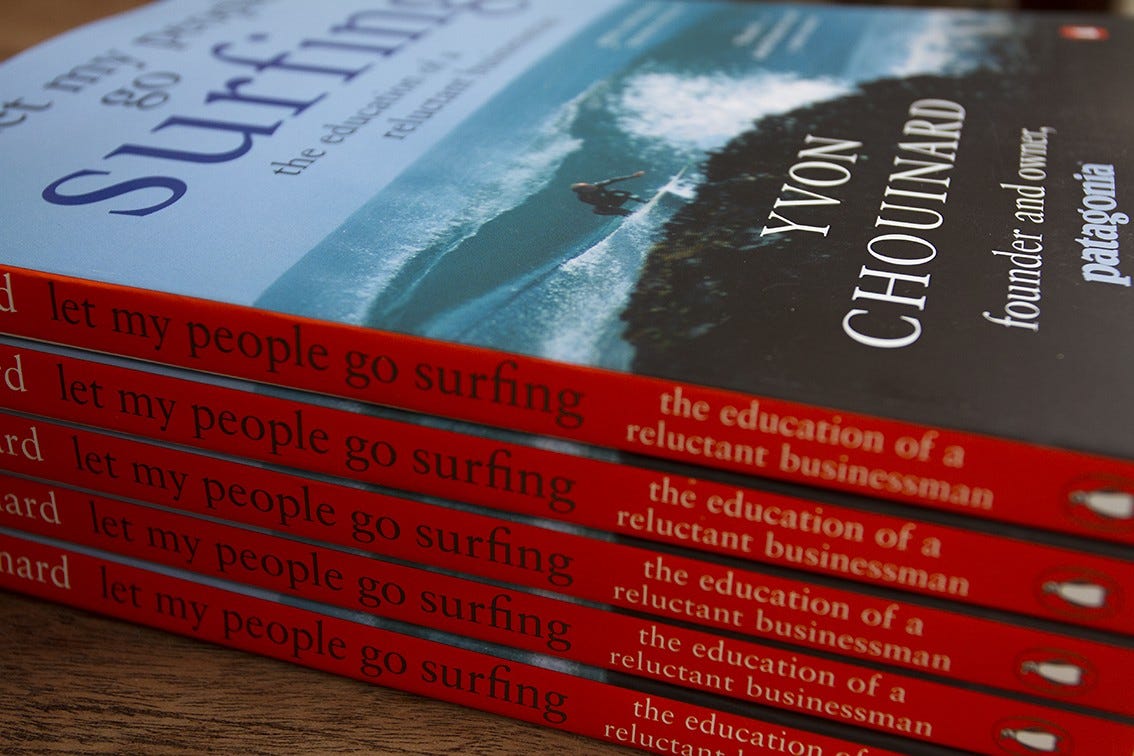Patagonia founder Yvon Chouinard’s philosophy is unlike any other company leader. At times, this book was hard to read because much of what Chouinard said opposed conventional, capitalistic wisdom. I wondered how he was running a successful international business while disregarding common practice. I admit that was closed-minded of me, but to expand your mind you must listen the thoughts of someone that thinks completely differently.

I learned a lot from this read and here of some of the things that stuck out to me:
Zen mindset
Chouinard touches on this many times. The idea is that if you do all the right things, you will end up in the right place. The example he uses is shooting a arrow into a target. Instead of focusing on hitting the center of the target, focus on drawing the arrow back, standing in the right position, being calm and breathing.
He applies this mindset to how he does business. As a company, Patagonia takes all of the right steps, not knowing exactly how they will be successful, but confident that each step is a good one. In some brief reading I did on the Zen mindset, it mentioned focusing on the now and experiencing the present moments fully. Patagonia doesn’t set 10 year plans. There aren’t lofty goals dictating the company’s future activities, instead there are philosophies that guide the every day operations of the company.
Leading an examined life
This idea comes late in the book, but it resonated with me. Examination is at the heart of Patagonia. They are constantly reinventing products to lessen the burden on the environment. These changes cost money, they reduce profits and they’re difficult to implement. So why make them? The main reason is so Patagonia adheres to their philosophy of always seeking to minimize environmental impact. This means repeatedly examining processes and products to find room for improvement.
This is something from which any person or organization could benefit. Introspection is an essential ingredient in making progress. What are your strengths? Where are you falling short? Where could you be better? Use these questions not to criticize, but to wonder and to build for the future.
Simplify — evils of consumerism
This is harsh. It was hard to read. Consumerism is deeply embedded in American life and when you start to think about how many things we have, it gets overwhelming. I’m no exception. I’ve amassed too many t-shirts to fit in several drawers and countless other articles of clothing, yet I’m not satisfied. Shopping is still a fun and routine activity. Many media messages encourage the thought that spending money on products is a way to keep the economy lively. These thoughts make this is a complex problem to address. Here’s a crazy fact: In a lifetime, the average American will personally throw away 600 times his or her body weight, which for an average adult would leave a legacy of 90,000 pounds of trash at the end of their lifetime. (More facts)
Whatever position you hold on the economy or environment, I think we can all step back and realize that we could lower our level of consumption. Chouinard obviously doesn’t think that we should eliminate consumption, but in an interview he offers these words,
“Consume less, but consume better.” -Yvon Chouinard
I think this is advice that we could all take. Buy things that will last a long time. This philosophy is deep in Patagonia’s values. They don’t want to sell you anything unless you need it. They strive to delivery quality and longevity in all of their products.
Being part of the solution
In the above interview and in the book, Chouinard says that the hardest part is recognizing that you are part of the problem. Even though Patagonia is one of the most environmentally conscious companies in America, they still recognize that they create pollution. You can’t simply declare that you’re an environmentalist. Your choices dictate your true beliefs. If your choices are wasteful, it’s hard to convince someone that you care deeply for the environment solely because you support certain politicians. Issues like this are not binary. While political parties often divide us, we must recognize that on this spectrum, there is always room for improvement no matter where you start out.
Final thoughts
The ideas presented in this book pushed me outside of my comfort zone and helped me grow. I felt like I was standing too close to a fire. It burned to hear some of these points that are opposite to my way of thinking, but it warmed my heart to their existence. I’m left with more empathy for the environment and the people that work in conservation.
Chouinard’s story was that of a selfless businessman. He grew Patagonia organically and he did so while demonstrating how a company can be an agent for change. To me, this is what is so brilliant about entrepreneurship. Chouinard didn’t look at the future that society had laid out for him. He created his path and followed it bravely.
I highly recommend this book to anyone interested in grassroots change or a model for developing a value-driven organization. This book will challenge your pre-conceived notions and leave you hopeful for the future of sustainable business.
Leave a Reply